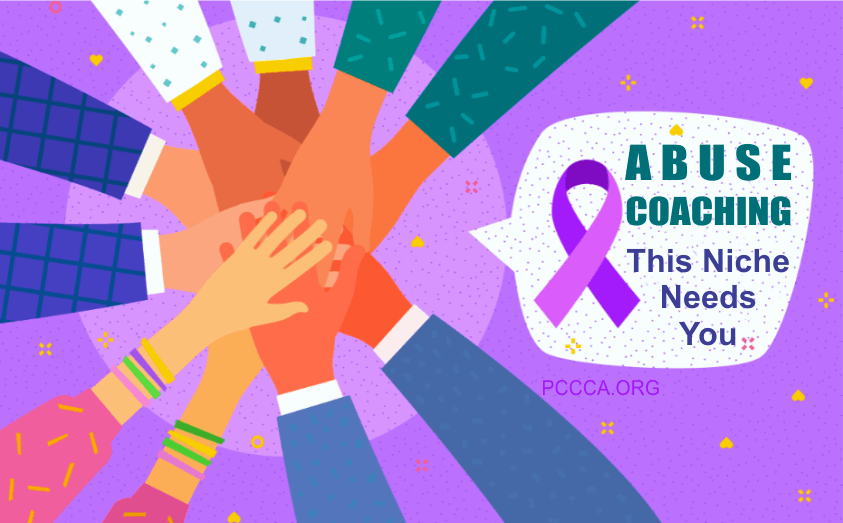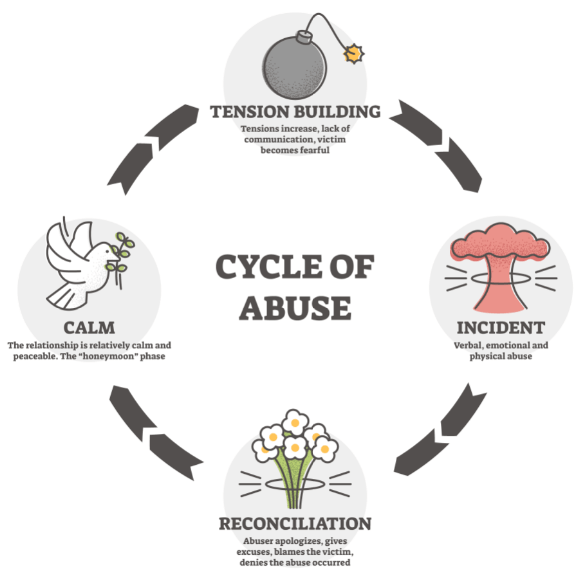Benefits of coaching for abuse and domestic violence
In this post, I will depart from general coaching and counseling methods and training to explore a much-needed specialty. Some of the most pervasive, often hidden issues in our society are related to abuse and domestic violence. The Christian population is not immune to these issues. They exist in every financial and racial demographic and every type of household.
Categories of abuse include:
- Physical
- Verbal / Emotional
- Mental / Psychological
- Sexual
- Financial / Economic
- Cultural / Identity / Religious
Abuse in a relationship can include one or more of these behaviors. These symptoms may continue over time and frequently escalate. When we hear the word “abuse,” many of us think of physical abuse. It’s important to understand that physical assault is only one means of abuse, manipulation and control but it's far from being the only one. Generally speaking, physical abuse is not the initial form of abuse that the perpetrator will use.
Even if you do not specialize in this niche, you need to connect with someone who does so you can refer your client to a qualified practitioner.
This is a topic that is close to my heart because of my personal experiences. I know that healing is possible. I have seen true restoration take place. And I believe that is ultimately our Father’s will.
This is a complicated and difficult issue because there is so much hidden, so much guilt and shame around talking about it.
Abuse and domestic violence are such broad and deep topics that I certainly can’t cover everything you need to know. That said, my goal is to give you enough information so that you better understand the issues involved.
I also want to encourage you to use your coaching skills in this niche if God leads you to.
But I believe it’s time that life coaches learn more about coaching in this specialty. If God has given you a heart to help and the inner strength to face these tough issues, then by all means go for it. There are two tracks you could take when working in this specialty. You may take an educational track, to introduce coaching to your local agencies and do speaking around these topics. Or, you may have a heart to become the actual coaching service provider for the victim, their abuser or both, but not together. I’ll say more on that later.
Domestic violence leaves its victims full of fear, desperation and hopelessness. And those who manage to come out of its grasp often feel they have been left with nothing in their lives.
I believe coaching skillfully can make a huge difference in the lives of those who are willing to participate in and trust the process.
Victims and abusers have different issues and motives
This is true for the victim of abuse. It’s also valid for the perpetrator, if they are willing to get on their knees before God and also do some serious work.
Statistics show there is only a small percentage of perpetrators that ever recover or change. There are a few reasons for this.
In order to receive help, the abuser needs to face what they have done. They need to acknowledge the pain they have caused and that’s a tough pill to swallow for anyone, particularly someone who may have convinced themselves they did what was necessary or justified.
The main reason is that the issues within the mind of an abuser are also the same ones that tend to keep them there. Abuse is about power and control. The abuser has convinced themselves they are justified in their actions. Most abusers act from their insecurity while a narcissist acts from a high level of confidence and supremacy. But control and manipulation are their weapon.
And, when someone is convinced they are right and justified, they just don’t really have a compelling desire to change. They may attend counseling to get the court and agencies off their back or even to prove to the victim how much they are trying to change. But if there is not a heart change, these dangerous issues tend to persist and even escalate. Hence the low recovery rate.
On the other end of the spectrum we have the victim, who has a pervasive, compelling need to heal. They understand their future and perhaps even life depends on it. So the victims are generally far more agreeable to taking the needed steps.
The Cycle of Abuse
Abuse operates in a cycle, which makes it extremely difficult for a victim to extract themselves from it.
The reason that domestic violence cycles continue, is that the victim's thoughts and beliefs haven’t changed even though they may have arrived at a safe place.
I encourage you to look closely at the image below depicting how the cycle operates.
Generally the abuser arrives on the scene as a warm, caring, loving partner. It’s not unusual for them to give their victim a “rush” in the beginning of the relationship, showering them with attention, gifts and sweet words to draw them into their net.
Then, when the abuser feels threatened that their “victim” may want to leave, demonstrates too much independence or even says what the perpetrator believes is “the wrong thing”, tension begins to build. The victim becomes guarded, wanting to avoid conflict. Eventually what is wrong behavior becomes a moving target so the victim can’t predict what could set off the abuser.
But by then the victim has become so accustomed to the abuser’s presence, confessions of love and other sweet words, they barely notice their own increasing isolation and insecurity. Thus they’re unable to think clearly as they try to reason a solution to the growing tension.
When the abuser blames the victim for their words or actions, the victim believes they may truly be at fault, not realizing this is all part of the abuse cycle. Little by little their confidence wanes and what was once infatuation, turns to neediness and fear. You'll notice on the Cycle of Abuse at first there’s a buildup of tension, then an explosive abuse incident, then reconciliation, followed by a “honeymoon stage” of calm … until tension starts building again.
In order for the change to take hold and become a new lifestyle, the person must learn to think in new ways about themselves and understand how doing things the same old way will get the same old results.
They need to learn that their thoughts create emotions that drive their actions to bring the results they have. We teach you how to deconstruct destructive thought patterns to help them create and establish healthy thoughts and transformed lives.
The long road to healing from domestic violence
There is a long road to healing ahead of most victims and many of them do have the inner strength to overcome their past abuse. But in order for them to be successful they need a trusted person to come along side of them, to encourage them and hold them accountable. Many of them need a way to restore balance, sound thoughts and inner strength to walk away.
Victims must learn to create boundaries in order to remain safe and to prevent them from repeating actions that allowed them to fall into abusive relationships in the first place.
As I mentioned earlier, abuse is cyclical and does not just occur suddenly in a vacuum. In a high percentage of cases the abusers have convinced (gaslighted) their victims to believe they are of no value and are unable to think or live independently of the abuser.
It is my view from both personal experience and hearing from our graduates who use the skills they learn here at PCCCA, that coaching can be a real game-changer. It can help the victim learn and sustain new behaviors and thoughts in order to restore their lives.
FREE GUIDE
Securing Housing (& Other Resources) After Domestic Violence
Resource to help empower survivors of domestic violence
(This is an external source. We are not responsible for the availability of this information or page.)
The free guide includes:
Actionable steps for creating a plan to leave.
Financial and housing resources for different stages.
And even legal resources to help you know your rights.
The abuse and domestic violence coaching process
First, a strong word of caution. Do NOT agree to work with both the victim and perpetrator in the same session. Their issues are very different and the victim will probably be afraid to speak out truthfully during a session for (justifiable!) fear of retribution from the abuser. Retribution is very likely, even probable. It would jeopardize the safety of the victim. Never do that.
Typically, the process begins with a group meeting to explain how coaching works and how it can help them make the needed changes. Many victims have never heard of coaching or at least not in this context, so it creates needed awareness and familiarity with the process and the coach who is leading the group.
“There are far too many silent sufferers. Not because they don't yearn to reach out, but because they've tried and found no one who cares.”
~ Richelle E. Goodrich, Smile Anyway
Once safety and confidence in the coach has been established, victims become more willing to accept the challenges and agree to meet with a coach one to one.
With recent discoveries in neuroscience pertaining to how our brains work, how thoughts are processed and how emotions are created, coaches at PCCCA are far more equipped to help the victims identify their own thoughts, feelings and resulting actions.
Truly the knowledge has been life transforming. Victims regain their identity and begin exercises to help them understand themselves and their thoughts. They begin to understand the consequences of their own fears and insecurities. They start understanding and prioritizing their own needs and eventually setting goals to achieve them.
This can be a long and drawn out process to get to this place because the issues that they came from did not develop overnight nor can they be resolved immediately. Generally ongoing thought work is required and a coach can help facilitate the process once they have learned these methods.
It is said that a problem can’t be solved until it can be faced. This is very true for the victims of domestic violence. Not only are the victims emotionally injured from their trauma, but they carry guilt over the circumstances as well.
"Therefore, since we are surrounded by so great a cloud of witnesses, let us also lay aside every weight, and sin which clings so closely, and let us run with endurance the race that is set before us."
~ Hebrews 12:1 ESV
"And we know that for those who love God all things work together for good, for those who are called according to his purpose."
~ Romans 8:28
Again it takes time and often requires taking baby steps with the victim so they don’t become overwhelmed by the process or the reflection it requires.
All the while, making sure the victim can remain in a safe environment as well as feel supported and that they are in a safe space emotionally and mentally.
ABUSE HOTLINE INFORMATION
LOCAL:
To report abuse or get help locally call 911
NATIONAL DOMESTIC VIOLENCE HOTLINE:
1−800−799−SAFE (7233)
TTY 1−800−787−3224 or (206) 518-9361
Working in this specialty can be difficult and draining. There are so many emotions and stories coming from the victim. It is your job as the coach to remain strong yet kind, objective yet understanding, not to mention focused on the steps needed.
Self-Care for Coaches
You will need to be mindful of your own emotional stores and take breaks when you are feeling stretched. You will need to judge the progress being made in a session and adjourn while both you and the person you are coaching are in a stable mindset. Always try to end sessions on a high note and stir hope within your client.
Coaches need to learn how not to internalize what you are hearing in sessions. You need to be able to remain objective. Your goal is to help support your client to a place where they can become independent and gain confidence in using the thought work tools you will use.
Coaching professionals are usually compassionate by their nature. However this work is not easy, listening to other’s problems particularly when it involves high emotional triggers and abuse. This can take an emotional toll on the most experienced coach.
There are multiple effective methods for a coach to exercise self-care to avoid undue stress and possible burnout. As a Christian, be sure to include prayer and meditation on God’s word, regular breaks, deep breathing exercises, eating well, physical exercise, adequate sleep. I recommend all of these but the choice will depend on your unique needs.
"Or do you not know that your body is a temple of the Holy Spirit within you, whom you have from God? You are not your own, for you were bought with a price. So glorify God in your body."
~ 1 Corinthians 6:19-20 ESV
The victims’ needs are great but don’t sacrifice yourself to help others. If you burn out, your ability to do the work you are called to do may be greatly limited.
You want your clients to experience the confidence to call themselves survivors of their past. Additionally, your clients will need skills to identify the red flags of domestic abuse so that they don’t repeat the thoughts or actions that led them to succumb to the abusive relationship.
Final thoughts
This is certainly a challenging niche but incredibly rewarding when your client regains their independence, learns to provide for themselves and opens their heart to live and love again.
It is my hope that everyone called to this work and every abuse counselor will want to expand their skills to include coaching and the special thought work exercises. They can make such a powerful difference to the victims of abuse and truly help them transform their lives.
I know some of our graduates specialize in this or a related niche. If you have experience working in this specialty I’d love to hear your thoughts on this topic in the area provided for comments below.
Get certified as a coach or counselor!
There are many professional certifications to choose from.





